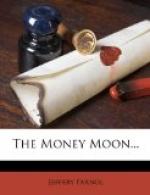Anthea was half-sitting, half-kneeling among the cushions in the corner of the deep window, apparently still lost in contemplation of the moon. So much so, that she did not stir, or even lower her up-ward gaze, when Bellew came, and stood beside her.
Therefore, taking advantage of the fixity of her regard, he, once more, became absorbed in her loveliness. Surely a most unwise proceeding—in Arcadia, by the light of a midsummer moon! And he mentally contrasted the dark, proud beauty of her face, with that of all the women he had ever known,—to their utter, and complete disparagement.
“Well?” enquired Anthea, at last, perfectly conscious of his look, and finding the silence growing irksome, yet still with her eyes averted,—“Well, Mr. Bellew?”
“On the contrary,” he answered, “the moon is on the wane!”
“The moon!” she repeated, “Suppose it is,—what then?”
“True happiness can only come riding astride the full moon you know,—you remember old Nannie told us so.”
“And you—believed it?” she enquired scornfully.
“Why, of course!” he answered in his quiet way.
Anthea didn’t speak but, once again, the curl of her lip was eloquent.
“And so,” he went on, quite unabashed, “when I behold Happiness riding astride the full moon, I shall just reach up, in the most natural manner in the world, and—take it down, that it may abide with me, world without end.”
“Do you think you will be tall enough?”
“We shall see,—when the time comes.”
“I think it’s all very ridiculous!” said Anthea.
“Why then—suppose you play for me, that same, plaintive piece you were playing as I came in,—something of Grieg’s I think it was,—will you, Miss Anthea?”
She was on the point of refusing, then, as if moved by some capricious whim, she crossed to the piano, and dashed into the riotous music of a Polish Dance. As the wild notes leapt beneath her quick, brown fingers, Bellew, seated near-by, kept his eyes upon the great, red rose in her hair, that nodded slyly at him with her every movement. And surely, in all the world, there had never bloomed a more tantalizing, more wantonly provoking rose than this! Wherefore Bellew, very wisely, turned his eyes from its glowing temptation. Doubtless observing which, the rose, in evident desperation, nodded, and swayed, until, it had fairly nodded itself from its sweet resting-place, and, falling to the floor, lay within Bellew’s reach. Whereupon, he promptly stooped, and picked it up, and,—even as, with a last, crashing chord, Anthea ceased playing, and turned, in that same moment he dropped it deftly into his coat pocket.
“Oh! by the way, Mr. Bellew,” she said, speaking as if the idea had but just entered her mind, “what do you intend to do about—all your furniture?”
“Do about it?” he repeated, settling the rose carefully in a corner of his pocket where it would not be crushed by his pipe.




